L.A.’s DWP stops issuing shut-off notices amid billing problem

The head of the Los Angeles Department of Water and Power said Wednesday that his agency has stopped issuing shut-off notices as it tackles problems associated with as many as 70,000 late or inaccurate customer bills.
Faced with questions from City Council members upset over the billing debacle, DWP General Manager Ron Nichols said his agency also will not initiate new collections on unpaid bills through the end of the year.
Since the DWP switched to new customer software three months ago, ratepayers have experienced delayed charges, bills that are dramatically higher than they should be and long hold times when they call demanding answers. Nichols told council members that corrections are underway, with reimbursement checks already being received by some customers.
The situation “is getting better each day,” he said.
Despite those reassuring words, the council voted 12 to 0 to impose a moratorium on new shut-off notices. As part of that vote, the council agreed to give the DWP the flexibility to cut off service to those whose accounts were delinquent before the utility switched to the new billing system.
Councilman Mitchell Englander, who proposed the moratorium, said the shut-off notices sent by the DWP in recent weeks had left families and seniors on fixed incomes “scared to death.”
“We’ve heard of nightmare stories … where people are on autopay and suddenly their savings are sucked out of their account and they can’t pay their bills or they’re bouncing checks,” said Englander, who represents part of the west San Fernando Valley.
The DWP said converting to a new customer system is expected to cost $162 million once staff time is included. Weeks after that process began, ratepayers started coming forward with horror stories about massively inflated bills.
DWP customer Maria Schriber, 34, received two overdraft notices from her bank after the utility billed her for $1,766 — an amount she described as roughly 40 times her typical bimonthly bill. Schriber, who lives in a 400-square-foot apartment, pays the utility through an automated deduction system and did not have the funds available in her account for such a large sum.
The Silver Lake resident said that over a three-week period, she spent 10 hours on the phone with the DWP and her bank trying to resolve the problem. She said that of the seven utility employees who spoke with her, two were pleasant and helpful, four were unhelpful and one was so dismissive he made her cry while she was on the phone.
The issue was resolved last week, when a DWP employee personally delivered a refund. The check was for around $1,500, Schriber said, because the DWP had repeatedly undercharged her earlier this year.
“I do appreciate those two employees who were nice to me. And they refunded my money, so I’m grateful for that,” Schriber said. “But the whole experience left a pretty negative taste in my mouth.”
Looking to cut long customer waiting times, the DWP launched a new system Tuesday that enables ratepayers to dial a number and leave a message asking for a callback. High call volumes have exasperated DWP customers in recent weeks.
Insurance agent Eric Jacobsen said he hung up after waiting on hold for an hour and 20 minutes with the DWP this month. Jacobsen, who lives in Northridge, contacted the utility after it billed him nearly $3,900 for service that should have cost around $2,400. After a second call lasting 45 minutes, he found a DWP service representative.
“She looked up my records and agreed [the bill] was wrong but said it was out of her hands,” he said. “She couldn’t even tell me how long it was going to take, nor could the supervisor. That’s when I asked her, send me some money back. She said ‘We can’t. You’re on autopay.’ ”
DWP spokesman Joe Ramallo said Jacobsen, like Schriber, will receive a refund. “We have canceled the bill and will issue a corrected bill based on his meter data,” he said.
More to Read
Sign up for Essential California
The most important California stories and recommendations in your inbox every morning.
You may occasionally receive promotional content from the Los Angeles Times.










